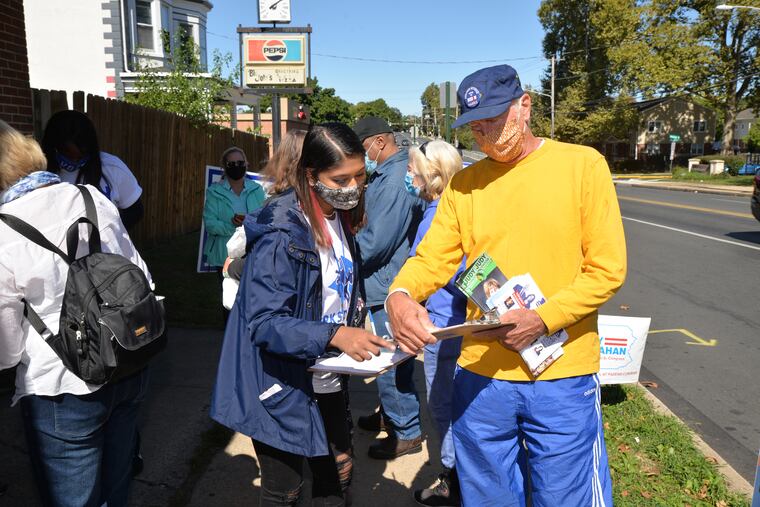Pa.’s suburbs show the power of ‘eds and meds’ in turning red districts blue | Opinion
Today, the medical profession leans Democratic, a shift that's shaping votes in a Reading suburb and beyond.

Located across the Schuylkill from Reading, the Berks County borough of Wyomissing remains as intended over a century ago: an idyllic suburb. Curving boulevards and tidy avenues, canopied by trees, feature beautiful housing amid parks and trails. Then, beyond Penn Avenue, sprawling before semi-detached houses, are the Knitting Mills — a monument to the community’s foresight.
Planning ahead is tradition in Wyomissing, where, early last century, founders Ferdinand Thun and Henry Janssen meticulously designed a town for posterity. These visionary German immigrants ensured that the Knitting Mills — then known as Wyomissing Industries — adapted to the times. As women’s fashion dramatically changed in the 1920s, Thun and Janssen’s enterprise became the world’s top manufacturer of women’s hosiery. When the Great Depression struck, they redeployed workers to build attractive homes across economic classes in Wyomissing and its sister community, West Reading.
» READ MORE: How Trump and Biden look in a county that’s a ‘microcosm’ of Pennsylvania
Though evolving fashion tastes couldn’t save the knitting business, the VF Corp. pioneered outlet shopping at the former mills in Wyomissing. Since then, retail, accelerated by the pandemic, has transitioned from brick to pixels. Last year, VF’s longtime outlet closed. Now, the Knitting Mills’ historic brick buildings comprise a massive mixed-use development project.
One tradition, though, is changing. The borough’s civic leaders, including Thun and Janssen, tended to be Republican. But in November, for the first time in recent memory, Wyomissing favored the Democratic presidential candidate. From voter registration to local governance, Wyomissing appears Republican, but the swing from Donald Trump to Joe Biden reflects a shift in modern politics: Suburban prosperity — especially among younger professionals — is translating into Democratic votes. Phil Wert, a West Reading councilmember, told me how many of his under-50 Wyomissing friends lean Democratic.
A booming “eds and meds” economy is fueling Wyomissing’s gradual political shift. The Knitting Mills complex, for example, houses the corporate offices of Tower Health, which oversees its flagship, Reading Hospital, and suburban Philadelphia hospitals. Meanwhile, where Wyomissing Industries’ foundry once stood, Philadelphia’s Drexel University will open a medical school this fall.
Today, the medical profession leans Democratic — a shift that preceded the 2020 election. In recent decades, especially post-Obamacare, younger physicians joined health systems like Tower Health or Drexel. The result, as the Wall Street Journal reported in 2019, was “fewer business-owner physicians who back the GOP for its pro-employer policies.” This new dynamic, in turn, flipped doctors’ political contributions. As the Journal noted, “In 1990, 61% of national political campaign contributions by physicians went to Republicans.” By 2018, nearly two-thirds of contributions went to Democrats.
In 2020, Hershey — home to the iconic chocolate company, but also Penn State’s College of Medicine — flipped from Trump to Biden. Montour County, a GOP bastion, delivered notable gains for a Democratic candidate. Its county seat, Danville — headquarters of Geisinger’s large health system — went for Biden. This trend among white-collar workers is national. As Kenan Fikri, the Economic Innovation Group’s director of research, told me, “We’re seeing the country’s political realignment really break strongly along occupational lines, not just urban/rural ones,” with eds and meds “at the heart of this realignment.”
According to Kevin Boughter, Berks County’s Democratic chairman, “tons of Biden signs were out [in Wyomissing]” before November, “and four years ago, it was completely the other way around.”
» READ MORE: Democrats had a brutal 2020 in Pennsylvania besides Biden. Now they’re charting a path forward.
Wyomissing’s rejection of Trump could prove an aberration. After all, it’s not modern progressivism, but the conservative values rooted in this region that make Wyomissing a Rockwellian community. Berks, moreover, is a GOP stronghold despite heavily Democratic Reading’s large population.
For now, Wyomissing’s sense of engagement with the community is due, in large part, to nonideological local government leaders focused on preserving Wyomissing’s quality of life. The borough’s Republican mayor, Fred Levering, noted how the local council meets in Borough Hall, the former Thun mansion where portraits of Wyomissing’s founders adorn the chamber’s walls. He referenced a comment he made in a local documentary: “I often glance over there and think, ‘My job is basically don’t screw this up.’”
In the case of its politics, though, Wyomissing and similar eds-and-meds suburbs will be battlegrounds in next year’s midterms, when Pennsylvania will have heated gubernatorial and U.S. Senate races. Long term, Wyomissing’s prosperity might only further accelerate its shifting politics. As Wert observed, millennials are buying homes in the borough, and efforts are underway to restore passenger rail between Reading and 30th Street Station, just steps from Drexel’s main campus. Such developments will undoubtedly change political demography. Republicans will have to take note.
Charles F. McElwee is managing editor of the Commonwealth Foundation. He is the 2020-21 John Farley memorial fellow, part of the Fund for American Studies’ Robert Novak Journalism Program, and edits the public affairs page on Pennsylvania for RealClearPolitics, where a version of this piece first appeared. @CFMcElwee